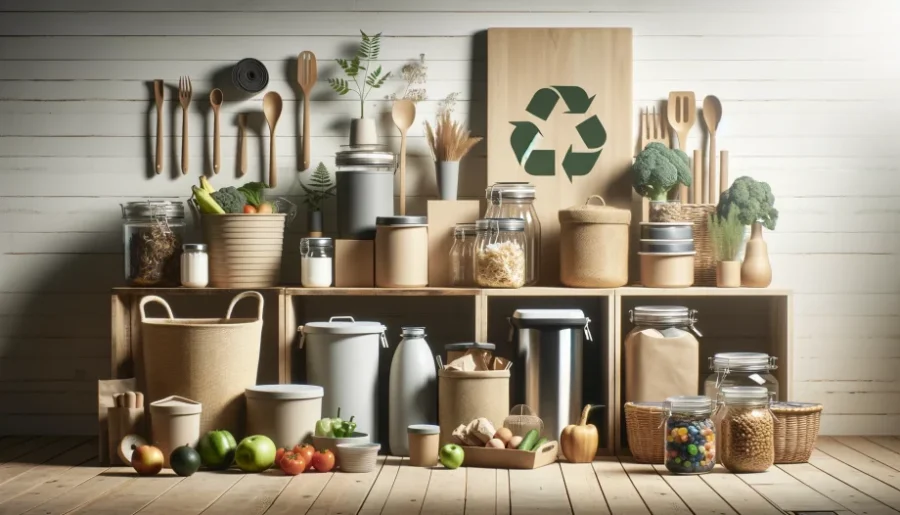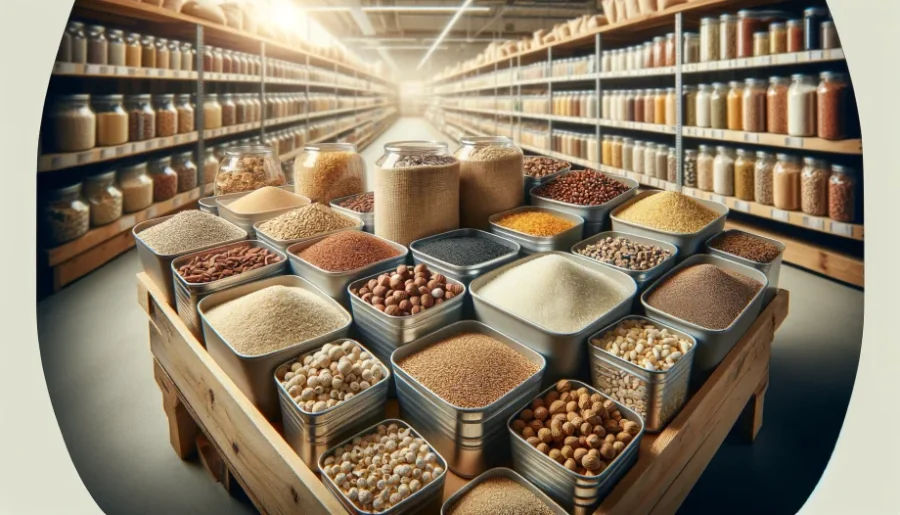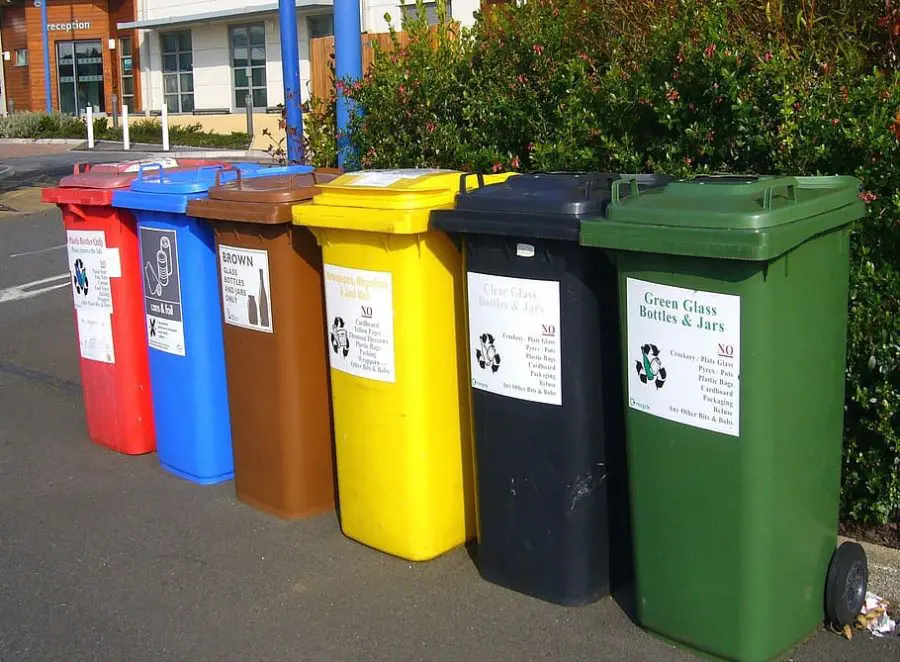
Explore the world of zero-waste principles and practices! Discover how adopting these sustainable practices can reduce waste, save resources, and create a healthier planet for all.
Zero-Waste Principles and Practices
Key Takeaways:
- Zero-waste principles and practices are guidelines for reducing waste and promoting sustainability.
- They include reducing, reusing, recycling, composting, and refusing unnecessary items.
- By adopting these practices, individuals and communities can minimize their environmental impact, conserve resources, and work towards a more sustainable future.
Zero-waste principles and practices are revolutionizing the way we think about waste and sustainability.
By embracing a lifestyle that minimizes waste and maximizes resource efficiency, we can make a positive impact on the environment and our own well-being.
Join us as we explore the key principles and practical tips for living a zero-waste life.
Zero-Waste Principles and Practices: A Comprehensive Guide
Zero-waste principles and practices are essential components of sustainable living.
They aim to minimize waste and promote resource conservation. This guide will explore the key principles of zero waste and provide practical advice on how to implement these practices in daily life.
What is Zero Waste?
Zero waste is a philosophy and design framework that promotes the elimination of waste through the reuse and recycling of materials.
It encourages a circular economy, where products are designed to be durable, repairable, and recyclable, minimizing the need for new resources and reducing environmental impact. World Economic Forum
World Economic Forum

The World Economic Forum (WEF) is an international non-governmental organization for public–private sector collaboration based in Cologny, Canton of Geneva, Switzerland. It was founded on 24 January 1971 by German engineer Klaus Schwab.
The foundation’s stated mission is improving the state of the world by engaging business, political, academic, and other leaders of society to shape global, regional, and industry agendas. The Forum states that the world is best managed by a self-selected coalition of multinational corporations, governments and civil society organizations (CSOs), which it expresses through initiatives like the Great Reset and the Global Redesign. Wikipedia
UN Sustainable Development Goals

The United Nations created 17 world development goals called the Sustainable Development Goals (SDGs). They were created in 2015 with the aim of peace and prosperity for people and the planet, now and into the future.
The SDGs emphasize the interconnected environmental, social and economic aspects of sustainable development by putting sustainability at their center. Wikipedia
Why Zero Waste is Important
Adopting zero-waste practices is crucial for environmental sustainability.
It helps reduce pollution, conserve natural resources, and mitigate climate change.
By minimizing waste, individuals and communities can contribute to a healthier planet and a more sustainable future. ( EPA)
What are the Principles of Zero Waste?

The principles of zero waste are fundamental guidelines that aim to minimize waste and promote sustainability.
They encompass a holistic approach to managing resources, emphasizing waste prevention, reuse, and recycling.
This section will explore these principles in detail, providing a roadmap for individuals and communities striving for a zero-waste lifestyle.
- Recycle: Recycling is a key component of zero waste, involving the conversion of waste materials into new products, thereby reducing the need for virgin materials and minimizing waste sent to landfills (Zero Waste International Alliance).
- Reduce: Reducing consumption and waste generation is fundamental to zero waste. It involves choosing durable, long-lasting products and minimizing the use of disposable items.
- Refuse: Refusing unnecessary products and packaging helps prevent waste from being generated in the first place. It involves saying no to single-use items and opting for products with minimal or no packaging.
- Reuse: Reusing items extends their lifespan and reduces the need for new products. It includes repairing, repurposing, and using refillable containers.
- Compost: Composting organic waste, such as food scraps and yard trimmings, turns it into nutrient-rich soil, reducing the amount of waste sent to landfills.
- Rot: The concept of rotting or composting is emphasized in some zero-waste communities, where organic waste is composted to minimize landfill waste.
- Conserve Energy: Zero waste also involves conserving energy through efficient resource use and supporting renewable energy sources.
- Improve Community Relations: Zero waste promotes community engagement and cooperation in waste reduction efforts.
- Reduce Food Waste: Minimizing food waste is a critical aspect of zero waste, involving careful meal planning, proper storage, and composting of food scraps.
- Reduce Landfill Trash: The ultimate goal of zero waste is to eliminate the need for landfills by ensuring that all materials are reused, recycled, or composted.
- Refuse Unnecessary Products: Avoiding products that are not essential or that come with excessive packaging is key to reducing waste.
- Buy in Bulk: Purchasing products in bulk reduces packaging waste and often results in cost savings.
- Extended Producer Responsibility: This principle holds manufacturers accountable for the entire lifecycle of their products, encouraging them to design products that are easily recyclable or reusable.
- Lower the Costs of Waste Management: By reducing waste, communities can save money on waste management and disposal.
- Prevent Pollution: Zero waste practices help prevent pollution by reducing the amount of waste generated and promoting the use of non-toxic materials.
- Promote Materials as Resources: In a zero-waste system, materials are viewed as valuable resources to be conserved and reused, rather than disposed of as waste.
- Take Charge of Food Waste: Individuals and communities are encouraged to take proactive steps to reduce food waste, such as composting and donating excess food.
- Zero Waste Infrastructure: Developing infrastructure that supports zero-waste practices, such as composting facilities and recycling centers, is essential for achieving zero-waste goals.
Zero Waste Examples
Zero waste can be implemented in various ways, from individual actions to community-wide initiatives.
Examples include using reusable shopping bags, participating in community composting programs, and supporting businesses that prioritize sustainability and waste reduction.
Individual Actions
- Using Reusable Containers: Opt for reusable water bottles, coffee cups, and food containers instead of disposable ones.
- Choosing Package-Free Products: Select products with minimal or no packaging, such as bulk foods, bar soaps, and refillable personal care items.
- DIY Solutions: Create your own cleaning products and personal care items using natural ingredients to reduce packaging waste and avoid harmful chemicals.
Community Initiatives
- Community Composting Programs: Participate in or advocate for local composting programs that turn organic waste into valuable soil amendments.
- Zero Waste Events: Support or organize events that minimize waste through reusable dishes, composting, and recycling.
- Education and Outreach: Engage in community education efforts to raise awareness about zero waste practices and their benefits.
Business Practices
- Sustainable Packaging: Support businesses that use eco-friendly packaging materials, such as compostable or recyclable options.
- Product Stewardship: Choose companies that take responsibility for the entire lifecycle of their products, including end-of-life disposal.
- Green Procurement: Encourage workplaces and institutions to adopt procurement policies that prioritize sustainable and zero-waste products.
By incorporating these examples into our daily lives and communities, we can make significant strides toward a zero-waste future.
Every action, no matter how small, contributes to a more sustainable and waste-free world.
Zero Waste Lifestyle
Living a zero-waste lifestyle involves making conscious choices to reduce waste in all aspects of life, from shopping and cooking to cleaning and personal care.
It requires a shift in mindset and habits, but it can lead to a more sustainable and fulfilling way of life.
Shopping and Cooking

- Mindful Shopping: Choose products with minimal packaging, buy in bulk, and bring your own bags and containers to the store.
- Meal Planning: Plan your meals to reduce food waste and make the most of your ingredients.
- Composting: Set up a compost system at home to turn food scraps into nutrient-rich soil for your garden.
Cleaning and Personal Care
- Eco-Friendly Cleaning Products: Use natural, non-toxic cleaning products or make your own with simple ingredients like vinegar and baking soda.
- Sustainable Personal Care: Opt for products with eco-friendly packaging, such as bar soaps and shampoo bars, and consider using reusable items like safety razors and menstrual cups.
Reducing, Reusing, Recycling

- Reduce: Prioritize reducing consumption and waste over recycling. Choose durable, long-lasting products and avoid single-use items.
- Reuse: Find creative ways to reuse items before disposing of them. Donate, sell, or repurpose items whenever possible.
- Recycle: Properly recycle materials that cannot be reused. Educate yourself on local recycling guidelines to ensure you’re recycling correctly.
Community Involvement
- Advocacy: Support policies and initiatives that promote waste reduction and sustainability.
- Education: Share your zero-waste journey and tips with others to inspire change in your community.
By embracing a zero-waste lifestyle, you’re not only reducing your environmental impact but also fostering a healthier and more sustainable way of living.
Every small change adds up to make a big difference.
Zero Waste Management in Schools
Schools can play a significant role in promoting zero waste by implementing recycling and composting programs, reducing paper usage, and educating students about sustainability and waste reduction.
By integrating zero waste practices into school operations and curricula, educational institutions can lead by example and foster a culture of environmental responsibility among students and staff.
Implementing Recycling Programs
- Recycling Bins: Place recycling bins in classrooms, cafeterias, and common areas to encourage proper disposal of recyclable materials.
- Education: Teach students about the importance of recycling and how to properly sort materials.
Composting Programs
- School Compost Bins: Set up compost bins on school grounds to collect food scraps and organic waste.
- Compost Education: Incorporate composting into the curriculum to teach students about the benefits of composting and how it works.
Reducing Paper Usage
- Digital Resources: Encourage the use of digital textbooks, assignments, and communication to minimize paper consumption.
- Double-Sided Printing: Implement policies for double-sided printing and copying to reduce paper waste.
Sustainability Education
- Environmental Curriculum: Integrate sustainability and environmental education into various subjects to raise awareness about waste reduction and conservation.
- Green Clubs: Establish eco-clubs or environmental groups to engage students in sustainability projects and initiatives.
Waste-Free Events
- Zero Waste Events: Organize school events, such as fairs and sports days, with a focus on zero waste practices, such as using reusable materials and avoiding single-use items.
Collaboration and Community Engagement
- Partnerships: Collaborate with local environmental organizations to support zero waste initiatives and provide additional learning opportunities for students.
- Community Involvement: Encourage students and staff to participate in community clean-up events and other zero waste activities.
By implementing zero waste management practices in schools, educators and administrators can foster a sustainable mindset among students and contribute to a healthier environment.
FAQ: Zero-Waste Principles and Practices
Navigating the journey towards zero waste can raise many questions.
This FAQ section aims to address common queries about zero-waste principles and practices, providing clarity and guidance for those looking to adopt a more sustainable lifestyle.
Q: What are the 5 principles of zero waste?
A: The 5 principles of zero waste are Refuse, Reduce, Reuse, Recycle, and Rot. These principles guide individuals and communities in minimizing waste and promoting sustainability.
Q: What are the 7 principles of zero waste?
A: The 7 principles of zero waste expand on the core 5 principles to include Repair and Rethink.
These additional principles emphasize the importance of fixing items instead of discarding them and considering the environmental impact of our actions.
Q: What are the 5 rules of the Zero Waste Association?
A: The 5 rules of the Zero Waste Association are similar to the 5 principles of zero waste: Refuse, Reduce, Reuse, Recycle, and Rot. They provide a framework for reducing waste and promoting sustainability.
Q: What are the basic rules of zero waste?
A: The basic rules of zero waste involve minimizing waste generation, maximizing resource efficiency, and promoting sustainable practices.
This includes refusing unnecessary items, reducing consumption, reusing products, recycling materials, and composting organic waste.
Q: What are the 3 Rs of zero waste?
A: The 3 Rs of zero waste are Reduce, Reuse, and Recycle. These principles focus on minimizing waste generation, extending the life of products, and recovering resources from waste materials.
Q: Why must we practice zero waste?
A: Practicing zero waste is essential for environmental sustainability, resource conservation, and pollution prevention.
It helps reduce greenhouse gas emissions, minimize the depletion of natural resources, and protect ecosystems from waste-related pollution.
Q: How can individuals contribute to zero waste?
A: Individuals can contribute to zero waste by adopting the 5 principles in their daily lives, such as refusing single-use plastics, reducing unnecessary purchases, reusing items, recycling correctly, and composting organic waste.
Q: What challenges do zero waste initiatives face?
A: Zero waste initiatives can face challenges such as limited access to bulk buying options, lack of infrastructure for composting and recycling, and resistance to changing consumption habits.
Overcoming these challenges requires community involvement, policy support, and increased awareness.
Q: Can zero-waste practices save money?
A: Yes, zero waste practices can save money by reducing the need for disposable items, lowering consumption, and minimizing waste disposal costs. Buying in bulk, reusing items, and composting can all contribute to financial savings.
By addressing these FAQs, individuals can gain a better understanding of zero-waste principles and practices and take meaningful steps towards a more sustainable lifestyle.
Embracing Zero-Waste Principles and Practices
Conclusion
Adopting zero-waste principles and practices is a meaningful step towards a more sustainable and environmentally friendly lifestyle.
By understanding and implementing the core concepts of zero waste, individuals and communities can significantly reduce their impact on the planet and contribute to a healthier, more sustainable future.
The Power of Individual Actions:
- Every Step Counts: Small changes in daily habits can accumulate to make a big difference. Whether it’s refusing a plastic straw, bringing your own shopping bags, or composting kitchen scraps, each action contributes to the zero-waste movement.
- Lead by Example: By adopting zero-waste practices, individuals can inspire others to follow suit, creating a ripple effect that amplifies the impact of their efforts.
Community Engagement and Collective Efforts:
- Collaboration is Key: Working together with local businesses, schools, and government entities can lead to more effective waste reduction strategies and the creation of supportive infrastructure for zero waste.
- Advocacy and Education: Raising awareness about the importance of zero waste and educating others on how to implement these practices are crucial for driving widespread change.
The Role of Policy and Innovation:
- Supportive Legislation: Advocating for policies that promote waste reduction, such as bans on single-use plastics and extended producer responsibility, is essential for creating a more sustainable society.
- Innovative Solutions: Embracing new technologies and innovative approaches to waste management can help overcome challenges and pave the way for a zero-waste future.
Continual Learning and Adaptation:
- Stay Informed: The zero-waste movement is constantly evolving. Staying informed about new developments and best practices is important for staying on track and making informed choices.
- Flexibility and Resilience: Being open to adapting and refining zero-waste practices over time is key to maintaining a sustainable lifestyle in the face of changing circumstances.
Some Final Thoughts
Embracing zero-waste principles and practices is a journey that requires commitment, creativity, and collaboration.
By making conscious choices, advocating for change, and working together, we can move towards a zero-waste world that values sustainability, resource conservation, and environmental stewardship.
Let’s continue to learn, grow, and take action for a better, waste-free future. Learn more: Mastering Zero-Waste Living: 7 Easy Tips and Tricks
Resources
Here are some authoritative resources to further explore the topic of zero-waste principles and practices:
United Nations Environment Programme (UNEP) – Sustainable Consumption and Production: The UNEP provides information on sustainable consumption and production, which includes aspects of zero waste. Visit UNEP
Zero Waste Europe: Zero Waste Europe is an organization that works to promote zero waste strategies and policies in Europe. Their website offers resources, case studies, and information on zero-waste initiatives. Visit Zero Waste Europe
The Story of Stuff Project: This organization focuses on the environmental and social impacts of consumer culture and advocates for a more sustainable and just world. They offer resources and information on reducing waste and consumption. Visit The Story of Stuff Project
Global Alliance for Incinerator Alternatives (GAIA): GAIA is an international network that advocates for zero waste and environmental justice. They provide resources and information on waste reduction and alternatives to incineration. Visit GAIA
Zero Waste International Alliance (ZWIA): The ZWIA provides a global definition of zero waste and offers guidelines and principles for achieving zero waste in communities and businesses. Visit ZWIA
U.S. Environmental Protection Agency (EPA) – Sustainable Materials Management: The EPA offers resources and information on sustainable materials management, which includes principles related to zero waste. Visit EPA
These resources offer valuable insights and information to deepen your understanding of zero-waste principles and practices and how they can be applied in various contexts.






